The Precious and Sacred Writings of Martin Luther (14 vols.)
Digital Logos Edition
Overview
Study some of Martin Luther’s most treasured works with this collection. John Nichaolas Lenker presents the largest systematic translation of his time of Luther’s works into English. Luther’s sermons on the Gospels and the Epistles are pinned to the liturgical year, and both his large and small catechisms—as well as his own commentary on them—are included. In addition, Lenker includes Luther’s commentaries on the Psalms and Genesis, his sermons on the Epistles, and his church postils. Please note: this product will download as 13 digital resources but is 14 volumes in print.
Get your bid on even more of Luther’s works with Spaeth’s Works of Martin Luther with Introductions and Notes (2 vols.).
This title is included in the following collections
You can save when you purchase this product as part of a collection.
The Martin Luther Collection (...
$299.99$299.99Logos 8 Lutheran Gold Legacy L...
$849.99$849.99Logos 7 Lutheran Gold Legacy L...
$849.99$849.99Logos 9 Lutheran Gold Legacy L...
$849.99$849.99
- $1,499.99
- $1,499.99
- $1,499.99
- $2,999.99$2,249.99
- $2,999.99
- $2,999.99
- $2,999.99
- $4,749.99$3,562.49
- $4,749.99
- $4,749.99
- $4,749.99
- $23,999.99$17,999.99
- $21,749.99
- $24,999.99

Key Features
- Brings together some of Martin Luther’s most treasured works
- Presents a large systematic attempt to translate Luther’s works
- Includes Luther’s Large and Small Catechisms with commentary
Product Details
- Title: The Precious and Sacred Writings of Martin Luther
- Author: Martin Luther
- Editor: John Nicholas Lenker
- Series: The Precious and Sacred Writings of Martin Luther
- Volumes: 14
- Pages: 4,463
- Christian Group: Lutheran
- Resource Type: Collected Works
- Topic: Theology
Individual Titles
- Luther’s Commentary on the First Twenty-Two Psalms
- Luther on the Creation: A Critical and Devotional Commentary on Genesis
- Luther on Sin and the Flood: Commentary on Genesis
- Luther’s Catechetical Writings: God’s Call to Repentance and Faith
- Luther’s Large Catechism: God’s Call to Repentance, Faith, and Prayer
- Luther’s Two Catechisms Explained by Himself: In Six Classic Writings
- Luther’s Christmas Sermons: Epistles
- Epistle Sermons: Epiphany, Easter, and Pentecost
- Luther’s Epistle Sermons: Trinity Sunday to Advent
- Luther’s Church Postil: Gospels Advent, Christmas, and Epiphany
- Luther’s Church Postil: Gospels, Epiphany, Lent, and Easter Sermons
- Luther’s Church Postil: Gospels: Pentecost or Missionary Sermons
- Luther’s Church Postil: Gospels First to Twelfth Sunday after Trinity
- The Epistles of St. Peter and St. Jude Preached and Explained
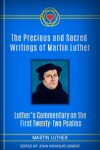
Luther began his academic lectures in 1513 with the Psalms and his exposition of them remain a mine of wealth for future scholars. This verse-by-verse commentary contains Luther’s detailed notes on the first 22 Psalms.
This work will be downloaded as two separate resources, Select Works of Martin Luther: An Offering to the Church of God in “The Last Days”: The Pious and Learned Commentary on the First Twenty-two Psalms (Psalms 1–11) and Select Works of Martin Luther: An Offering to the Church of God in “The Last Days”: The Pious and Learned Commentary on the First Twenty-two Psalms (Psalms 12–22).
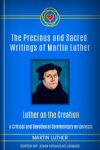
Martin Luther began this work in 1536 while he lectured at the University of Wittenberg, and finished it in 1545, just a few months before his death. In the first volume, Luther discusses how one should read the books of Moses and what readers should learn from them.
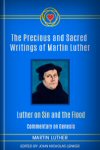
Volume two of Luther’s commentary on Genesis covers chapters four to nine. The subjects discussed include Abel’s murder; Cain’s punishment and descendants; Seth and his descendants; the world’s wickedness; Noah, the ark, and the flood; the Noahic covenant and its symbol of the rainbow; and the blessing of Shem and Japheth and cursing of Ham.
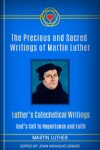
This book contains Luther’s small and large catechisms, which grew out of practical religious needs, and ultimately out of the institution of the confessional. These catechisms were meant both for schoolchildren and for adults, and Luther believed that they contained all the doctrinal information necessary for salvation.
The three works on Luther’s catechisms will be downloaded as a single resource.
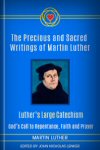
In this book, Luther outlines the Bible’s plan of salvation. He was grieved by what he considered the spiritual wretchedness of Christians, and he saw it as his duty to teach them the doctrine of eternal salvation. This book includes explanations on the Ten Commandments, the Apostle’s Creed, the Lord’s Prayer, Baptism, Confession, and the Lord’s Supper.
The three works on Luther’s catechisms will be downloaded as a single resource.
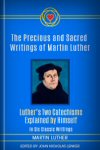
The three principal parts of the catechism—the Ten Commandments, the Creed, and the Lord’s Prayer—was the basis of popular education in the church. Luther valued them highly, declaring that they contained the substance of the Scriptures, all essential homiletic material, and the essentials of Christian knowledge. Luther preached on these subjects between June 1516 and Lent 1517.
The three works on Luther’s catechisms will be downloaded as a single resource.
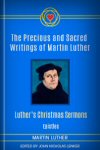
This volume contains twelve of Luther’s practical sermons on the epistles and exhorts Christians to practice the lessons taught by their parents and pastors. Luther argues that Christian knowledge and zeal must work together to develop a balanced Christianity.
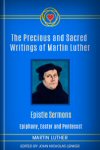
These sermons emphasize the importance of living like Christ, developing the fruits of the spirit, and understanding the significance of the resurrection. Based on the Epistles, they are designed to be preached from Epiphany to Pentecost.
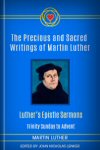
Preached by Luther from Trinity Sunday to Advent, these 24 practical sermons apply the Christian faith to everyday living.
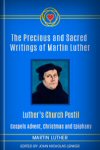
Many preachers during Luther’s era did not write their own sermons, so they depended on lessons and sermons from others. Luther considered many of these borrowed sermons not fully evangelical. Thus, he wrote his Postils to provide preachers with biblically sound sermons from which they could preach for each Sunday of the year. In this volume, Luther’s sermons cover the first Sunday in Advent to Epiphany.
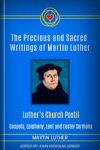
Many preachers during Luther’s era did not write their own sermons, so they depended on lessons and sermons from others. Luther considered many of these borrowed sermons not fully evangelical. Thus, he wrote his Postils to provide preachers with biblically sound sermons from which they could preach for each Sunday of the year. In this volume, Luther’s sermons cover Epiphany to Easter.
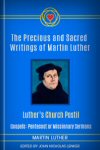
Many preachers during Luther’s era did not write their own sermons, so they depended on lessons and sermons from others. Luther considered many of these borrowed sermons not fully evangelical. Thus, he wrote his Postils to provide preachers with biblically sound sermons from which they could preach for each Sunday of the year. This volume includes 26 of Luther’s sermons for the Pentecost season.
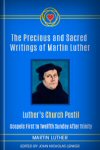
Many preachers during Luther’s era did not write their own sermons, so they depended on lessons and sermons from others. Luther considered many of these borrowed sermons not fully evangelical. Thus, he wrote his Postils to provide preachers with biblically sound sermons from which they could preach for each Sunday of the year. In this volume, Luther’s sermons cover the first Sunday to the 12th Sunday after Trinity.
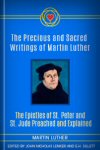
This book includes a collection of sermons on Peter and Jude that Luther began preaching on Sunday afternoons at the height of his conflicts with the Roman church. They are pure Luther as his local congregation heard him.
About Martin Luther
Martin Luther (1483–1546) was a key figure in the Protestant Reformation and one of the most significant figures in Western history. Over the course of his life, he was a monk, a priest, a professor of biblical literature, a Reformer, a husband, and a father.
Luther is most noted for his 95 Theses (1517), in which he argues that indulgences are not acts of penance which can replace true repentance. In 1520, Pope Leo X and Holy Roman Emperor Charles V demanded that Luther retract all of his writings. Luther refused. He was subsequently excommunicated and declared an outlaw.
Luther has been both praised and vilified for what he preached and wrote. His translation of the Christian Bible into the vernacular greatly influenced the church. His works continue to impact all Christians and animate the movement that bears his name. His works are also represented in Martin Luther’s Basic Theological Writings and the Luther’s Works collection.
About John Nicholas Lenker
John Nicholas Lenker (1858–1929) was baptized as a Presbyterian, but after attending a Lutheran Sunday School and Bible study, he united with the Lutheran Church. He attended the Missionary Institute at Selinsgrove and then graduated from Wittenberg College and Wittenberg Theological Seminary. In 1880, he was ordained to ministry and served as the president of the American Lutheran Immigrant Missionary Society. He started two Lutheran congregations in Grand Island, Nebraska, and served as pastor for one of them, St. Paul’s English Lutheran.